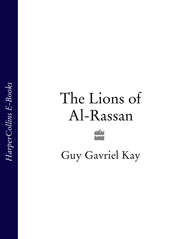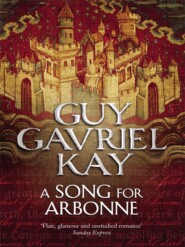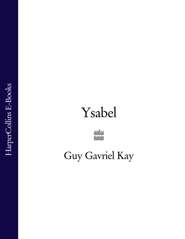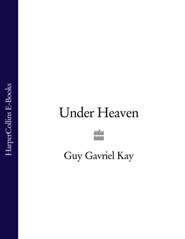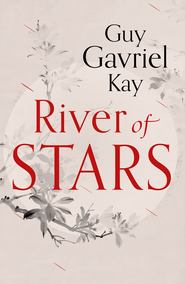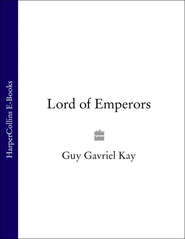По всем вопросам обращайтесь на: info@litportal.ru
(©) 2003-2025.
✖
Tigana
Автор
Год написания книги
2018
Настройки чтения
Размер шрифта
Высота строк
Поля
‘Let’s go!’ the man said urgently. ‘You and the boy. The others belong here—the youngest son and the grandson have easy explanations. Get rid of the extra glasses.’
‘What is it?’ Tomasso d’Astibar asked quickly, his eyes wide.
‘Twenty horsemen on the forest path. Continue your vigil and be as calm as you can—we won’t be far away. We’ll return after. Alessan, come on!’
The tone of his voice pulled Devin halfway to the door. Alessan was lingering though, his eyes for some reason locked on those of Tomasso, and that look, what was exchanged in it, became another one of the things that Devin never forgot, or fully understood.
For a long moment—a very long moment, it seemed to Devin, with twenty horsemen riding through the forest and a drawn sword in the room—no one spoke. Then:
‘It seems we will have to continue this extremely interesting discussion at a later hour,’ Tomasso bar Sandre murmured, with genuinely impressive composure. ‘Will you take a last glass before you go, in my father’s name?’
Alessan smiled then, a full, open smile. He shook his head though. ‘I hope to have a chance to do so later,’ he said. ‘I will drink to your father gladly, but I have a habit I don’t think even you can satisfy in the time we have.’
Tomasso’s mouth quirked wryly. ‘I’ve satisfied a number of habits in my day. Do tell me yours.’
The reply was quiet; Devin had to strain to hear.
‘My third glass of a night is blue,’ Alessan said. ‘The third glass I drink is always of blue wine. In memory of something lost. Lest on any single night I forget what it is I am alive to do.’
‘Not forever lost, I hope,’ said Tomasso, equally softly.
‘Not forever, I have sworn, upon my soul and my father’s soul wherever it has gone.’
‘Then there will be blue wine when next we drink after tonight,’ said Tomasso, ‘if it is at all in my power to provide it. And I will drink it with you to our fathers’ souls.’
‘Alessan!’ snapped the yellow-haired man named Baerd. ‘In Adaon’s name, I said twenty horsemen! Will you come?’
‘I will,’ said Alessan. He hurled his wineglass and Devin’s through the nearest window into the darkness. ‘Triad guard you all,’ he said to the five in the room. Then he and Devin followed Baerd into the moonlit shadows of the clearing.
With Devin in the middle they ran swiftly around to the side of the cabin farthest from the path that led to the main road. They didn’t go far. His pulse pounding furiously, Devin dropped to the ground when the other two men did so. Peering cautiously out from under a cluster of dark-green serrano bushes they could see the lodge. Firelight showed through the open windows.
A moment later Devin’s heart lurched like a ship caught by a wave across its bows, as a twig cracked just behind him.
‘Twenty-two riders,’ a voice said. The speaker dropped neatly to the ground on Baerd’s other side. ‘The one in the middle of them is hooded.’
Devin looked over. And by the mingled light of the two moons saw Catriana d’Astibar.
‘Hooded?’ Alessan repeated, on a sharply taken breath. ‘You are certain?’
‘Of course I am,’ said Catriana. ‘Why? What does it mean?’
‘Eanna be gracious to us all,’ Alessan murmured, not answering.
‘I wouldn’t be counting on it now,’ the man named Baerd said grimly. ‘I think we should leave this place. They will search.’
For a moment Alessan looked as if he would demur, but just then they heard a jingling of many riders from the path on the other side of the lodge.
Without another word spoken the four of them rose and silently moved away.
‘This evening,’ murmured Scalvaia, ‘grows more eventful by the moment.’
Tomasso was grateful for the elegant lord’s equanimity. It helped steady his own nerves. He looked over at his brother; Taeri seemed all right. Herado was white-faced, however. Tomasso winked at the boy. ‘Have another drink, nephew. You look infinitely prettier with colour in your cheeks. There is nothing to fear. We are here doing exactly what we have permission to be doing.’
They heard the horses. Herado went over to the sideboard, filled a glass and drained it at a gulp. Just as he put the goblet down the door crashed loudly open, banging into the wall beside it, and four enormous, fully armed Barbadian soldiers strode in, making the lodge seem suddenly small.
‘Gentlemen!’ Tomasso fluted expertly, wringing his hands. ‘What is it? What brings you here, to interrupt a vigil?’ He was careful to sound petulant, not angry.
The mercenaries didn’t even deign to look at him, let alone reply. Two of them quickly went to check the bedrooms and a third seized the ladder and ran up it to examine the half-loft where the young singer had been hiding. Other soldiers, Tomasso registered apprehensively, were taking up positions outside each of the windows. There was a great deal of noise outside among the horses, and a confusion of torches.
Tomasso abruptly stamped his foot in frustration. ‘What is the meaning of this?’ he shrilled as the soldiers continued to ignore him. ‘Tell me! I shall protest directly to your lord. We have Alberico’s express permission to conduct this vigil and the burial tomorrow. I have it in writing under his seal!’ He addressed the Barbadian captain standing by the door.
Again it was as if he hadn’t even spoken so completely did they disregard him. Four more soldiers came in and spread out to the edges of the room, their expressions blank and dangerous.
‘This is intolerable!’ Tomasso whined, staying in character, his hands writhing about each other. ‘I shall ride immediately to Alberico! I shall demand that you all be shipped straight back to your wretched hovels in Barbadior!’
‘That will not be necessary,’ said a burly, hooded figure in the doorway.
He stepped forward and threw back the hood. ‘You may make your childish demand of me right here,’ said Alberico of Barbadior, Tyrant of Astibar, Tregea, Ferraut and Certando.
Tomasso’s hands flew to his throat even as he dropped to his knees. The others, too, knelt immediately, even old Scalvaia with his game leg. A black mind-cloak of numbing fear threatened to descend over Tomasso, trammelling all speech and thought.
‘My lord,’ he stammered, ‘I did not . . . I could . . . we could not know!’
Alberico was silent, gazing blankly down upon him. Tomasso fought to master his terror and bewilderment. ‘You are most welcome here,’ he bleated, rising carefully, ‘most welcome, most honoured lord. You do us too much honour with your presence at my father’s rites.’
‘I do,’ said Alberico bluntly. Tomasso received the full weight of a heavy scrutiny from the small eyes, close-set and unblinking deep, in the folds of the sorcerer’s large face. Alberico’s bald skull gleamed in the firelight. He drew his hands from the pockets of his robe. ‘I would have wine,’ he demanded, gesturing with a meaty palm.
‘But of course, of course.’
Tomasso stumbled to obey, intimidated as always by the sheer, bulky physicality of Alberico and his Barbadians. They hated him, he knew, and all his kind, over and above everything else these conquerors felt about the people of the Eastern Palm whose world they now ruled. Whenever he faced Alberico, Tomasso was overwhelmingly conscious that the Tyrant could crack his bones with bare hands and not think twice about having done so.
It was not a comforting line of thought. Only eighteen years of carefully schooling his body to shield his mind kept his hands steady as they carried a full glass ceremoniously over to Alberico. The soldiers eyed his every movement. Nievole was back by the larger fire, Taeri and Herado together by the small one. Scalvaia stood, braced upon his cane, beside the chair in which he’d been sitting.
It was time, Tomasso judged, to sound more confident, less guilty. ‘You will forgive me, my lord, for my ill-judged words to your soldiers. Not knowing you were here I could only guess they were acting in ignorance of your wishes.’
‘My wishes change,’ Alberico said in his heavy, unchanging voice. ‘They are likely to know of those changes before you, bar Sandre.’
‘Of course, my lord. But of course. They—’ ‘I wanted,’ said Alberico of Barbadior, ‘to look upon the coffin of your father. To look, and to laugh.’ He showed no trace of an inclination towards amusement.
Tomasso’s blood felt suddenly icy in his veins. Alberico stepped past him and stood massively over the remains of the Duke. ‘This,’ he said flatly, ‘is the body of a vain, wretched, fatuous old man who decreed the hour of his own death to no purpose. No purpose at all. Is it not amusing?’
He did laugh then—three short, harsh barks of sound that were more truly frightening than anything Tomasso had ever heard in his life. How had he known?
‘Will you not laugh with me? You three Sandreni? Nievole? My poor, crippled, impotent Lord Scalvaia? Is it not diverting to think how all of you have been brought here and doomed by senile foolishness? By an old man who lived too long to understand how the labyrinthine twistings of his own time could be so easily smashed through with a fist today.’ His clenched hand crashed heavily down on the wooden coffin lid, splintering the carved Sandreni arms. With a faint sound of distress Scalvaia sank back into his chair.
‘My lord,’ Tomasso gulped, gesticulating. ‘What can you possibly mean? What are you—’
He got no further than that. Wheeling savagely Alberico slapped him meatily across the face with an open hand. Tomasso staggered backwards, blood spattering from his ripped mouth.






